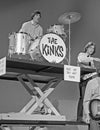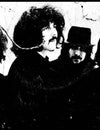
10 Bands That Triumphed Over Lineup Changes
Discover how these iconic bands refused to let lineup changes destroy their success! These ten bands engineered some of the most significant member changes in rock history. But they still managed to reach creative and popular heights. From Deep Purple to Small Faces/Faces, we explore how these bands adapted to changing lineups to maintain their place in music history.
Small Faces/Faces:
Embed from Getty ImagesWhen One Singer Leaves, Another Steps In When Steve Marriott left Small Faces to form Humble Pie with Peter Frampton, his former bandmates didn't skip a beat. They brought in Rod Stewart and Ronnie Wood from the Jeff Beck Group. With a new sound and lineup, Small Faces became Faces. The mod pop group turned into a rough and ragged rock and roll band. Their success continued, and they influenced a generation of punk rockers.
Deep Purple:
Embed from Getty ImagesThe Ever-Revolving Titans of Hard Rock Deep Purple has experienced some major lineup changes since their inception in 1968. But they have always managed to keep the magic alive. With four different lineups, Deep Purple has created a sound that transcends time. From the prog group led by Rod Evans to the hard rock band with singer David Coverdale, they’ve always evolved. Today, they continue to rock with their eighth lineup, which includes drummer Ian Paice, their only founding member.
Pretenders:
Embed from Getty ImagesChrissie Hynde's Unstoppable Force After the tragic loss of founding members James Honeyman-Scott and Pete Farndon to drug-related deaths, the Pretenders could have called it quits. But frontwoman Chrissie Hynde had other plans. She recruited a few friends and recorded the hit 'Back on the Chain Gang.' Then, with journeyman guitarist Robbie McIntosh, they released 'Learning to Crawl.' The album stands as one of their greatest works. The lineup continues to evolve behind Hynde, but the music lives on.
The Yardbirds:
Embed from Getty ImagesThe Yardbirds were a British rock band that produced some of the greatest guitarists in rock history, including Eric Clapton, Jimmy Page, and Jeff Beck. When Clapton left, he suggested Page as a replacement, but Page suggested Beck instead. A year later, Page joined the band and switched to share co-lead guitar duties with Beck. The band's influence on hard rock bands cannot be overstated, and the (New) Yardbirds eventually turned into Led Zeppelin in 1968.
Pink Floyd:
Embed from Getty Images
Pink Floyd began as a psychedelic pop outfit masterminded by Syd Barrett. When Barrett's mental issues began to take a toll on the group, the other members of Pink Floyd took control. The new lineup would meddle with sonic experiments before hitting gold with 1973's prog classic 'The Dark Side of the Moon.' Other progressive rock epics filled out the band's remarkable '70s run.
Allman Brothers Band:
Embed from Getty ImagesWhen Duane Allman died in a motorcycle crash in 1971, the band completed the landmark recording, 'Eat a Peach,' without him. Gregg Allman and Dickey Betts soon scored two of their most enduring hits, 'Ramblin Man' and 'Jessica.' A new guitarist didn't join the band until a 1978 reunion. Future lineups included guitar greats such as Warren Haynes and Derek Trucks, who continue to pay tribute to the late, great Skydog.
Fleetwood Mac:
Embed from Getty ImagesFleetwood Mac started as a British blues-rock band in the late '60s with Peter Green at the helm. The band's sound changed as Green spiraled into mental illness, and the group transitioned to softer rock with the recruitment of John McVie's wife, Christine, in 1971 and the duo of Lindsey Buckingham and Stevie Nicks in 1975. This lineup became the most celebrated and produced some of the band's most iconic hits.
Van Halen:
Embed from Getty ImagesVan Halen enjoyed tremendous success in the '80s, but the band experienced significant lineup changes. Frontman David Lee Roth parted ways with the other members, and Sammy Hagar, formerly of Montrose, became the new singer. Despite fan skepticism, Hagar led the band to four #1 albums, beginning with 1986's '5150,' and many hit singles.
The Rolling Stones:
Embed from Getty ImagesThe Rolling Stones have endured the departures of significant members, including Brian Jones and Mick Taylor. Jones formed the band and fostered the Stones' blues-rock formula. Taylor aided the band in its remarkable winning streak during the late '60s/early '70s and played the best guitar solos ever heard on Stones recordings. When Taylor tired of the grind, Ronnie Wood stepped up. He's been part of the Richards/Wood "guitar weaving" team so long, it's easy to think that he's always been a Stone. The band has continued to roll on despite many changes.
AC/DC:
Embed from Getty ImagesAC/DC has endured many changes, but the most significant one occurred when lead singer Bon Scott died in 1980. The band continued with Brian Johnson as the new singer and produced 'Back in Black,' a tribute to their fallen comrade that included monster hits like the title track and 'You Shook Me All Night Long.' Johnson continues to belt out AC/DC classics of all eras.
COMMENTS
Tell us in the comments section below which bands are your favorite in terms of surviving an important lineup change. Which of other bands managed to do it successfully?


























































